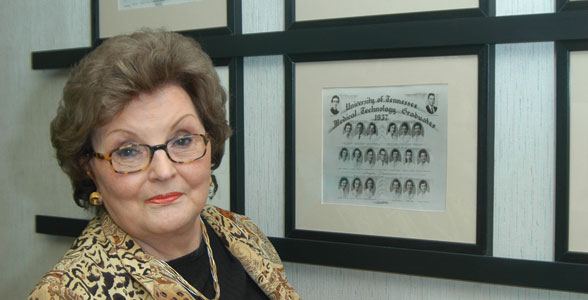Clinical laboratory scientists–hospitals would be dead in the water without them. Patients would go undiagnosed and disease untreated if it weren’t for this profession. Medical technology has come a long way in the past 40 years, and UT Health Science Center professor emerita Brenta Davis was instrumental in making it happen.
Ask anybody who ever worked with her to tell you about Davis, and the adulation starts flowing. Considered a mentor by nearly everyone in the UT Health Science Center (UTHSC) Department of Clinical Laboratory Sciences, she’s been called a visionary and an icon in her field. On meeting her, one fully expects to find her ensconced on a pedestal. Instead, we found her at her kitchen table. Now fully retired, she bubbles with enthusiasm about life in general and about UT Health Science Center in particular.
“The university turned out to be the place for me. Working with students was pure joy,” she said.
Davis, a UT graduate, launched her career as a medical technologist in 1956 at the Campbell Clinic in Memphis. She soon refocused her career and went to UTHSC as an instructor, moving up steadily to program director of the School of Medical Technology then to associate dean of the College of Allied Health Sciences. She served as acting dean of the college in 1998 just before she retired.
Throughout these years she encouraged, prodded, and challenged her students and colleagues to be more than they thought they could be. “Her true gift was giving us assignments we never thought we could do,” said Linda Ross, associate professor and chairman of Clinical Laboratory Sciences at UTHSC. “I remember her calling me to her office one day and telling me we needed a course in diagnostic molecular biology. ‘And I want you to teach it, of course,’ she said. Teach it? I knew very little about it, but I read up on it, went to workshops, and about a year later, I developed the curriculum. Today everything is molecular biology, and some schools don’t even offer it. We’ve had it for ten years. Brenta is a true visionary.”
Diane Wyatt, associate professor and assistant dean of the College of Allied Health Sciences, said Davis pushed her to become more active in the profession. “I would have been perfectly happy being an assistant professor forever, but she prodded and prodded. You just hated her when she was making you do something you thought you didn’t want to do, but without her, I wouldn’t be where I am today.”
When Davis started the first clinical laboratory science master’s program, Lani Collins, now an assistant professor in the department, was her first graduate student. “Brenta wooed me into the master’s program,” Collins remembered. “I’d known Brenta for a long time and was in awe of her. She was extremely influential and brought a new level of recognition to the profession.”
A “new level of recognition to the profession” is putting it mildly. While she was climbing the academic ladder and changing the lives of her students and colleagues, Davis also was exerting a profound impact on the clinical laboratory field nationally. “I became a political junkie,” she said, nonchalantly tossing off the accolade.
She advocated for the profession and became a regular in U.S. Senate and House hearings. In the 1990s she became a member of the accrediting agency for the profession. Her greatest legacy may be her work on the advisory committee for the Clinical Laboratory Improvement Act. According to Wyatt, “Brenta Davis was instrumental in getting national and state legislation passed that empowered the CLS professionals. She helped raise the standards of the entire profession.”
Davis also served a term as president of the American Society for Clinical Laboratory Science. Her textbook, Clinical Laboratory Utilization and Consultation, which she wrote in the 1990s, is still in use today because, said Collins, the book was clearly ahead of its time.
“I wrote it to assist physicians in using labs more effectively and to help laboratory professionals better understand where the doctors were coming from,” Davis said.
“I swear she had a crystal ball to see where the field was going,” Ross said. “Because of her vision, our program is cutting edge at preparing scientists for the workplace. I constantly find myself asking What would Brenta do?”
“People like Brenta are pivotally active. The rest of us make an effort, but we’re not shedding blood like she did,” Collins said.
Davis contributed to her profession throughout her career. Typical of her nature, she is now ensuring that future UTHSC students will be able to pursue their dreams. Through a generous endowment, which will fund four scholarships a year in clinical laboratory technology, her commitment to the UT Health Science Center and its students lives on.
“My work at the Health Science Center was a labor of love. That was my spot; it truly has been my alma mater,” Davis said. “We accomplished a lot together. I’m very proud that our department is one of the most respected in the country. It’s worth giving to.”



